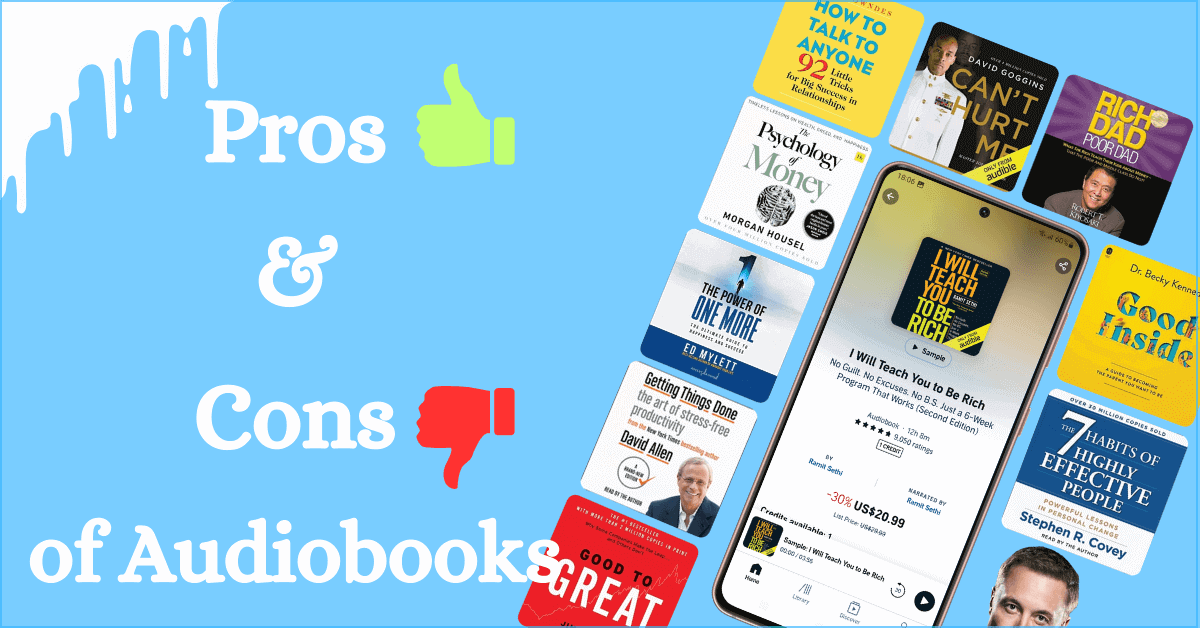It is no secret that I love audiobooks because of their entertainment value and many other benefits. While there are plenty of advantages of audio format, it makes more sense to read the physical book in some scenarios.
In this article, I will discuss the pros and cons of audiobooks and highlight the similarities between the audio format and physical books.
So, let’s find out when it makes more sense to listen to a book and when reading is the best option.
15 Pros of Audiobooks
Here are some of the key advantages of audiobooks over physical books from my experience so far.
- Multitasking
- Portability
- Accessibility/ Availability
- No Dedicated Reading Gadget Required
- Audiobooks are Never Out of Stock
- Storytelling At Its Best
- Ideal Format for Road Trips
- Benefits for Bain
- Ideal Medium for People With Reading Difficulties
- No Eye Strain
- Finish More Books
- Environment Friendly
- Get Over the Reading Slumps
- Helpful for Second- Language Learners
- Immersion Reading Benefits

1: Multitasking
Audiobooks require less attention and focus than reading. You can enjoy them, like listening to music, while doing other things. I love listening to audiobooks on my morning walks and runs.
Listen to your favorite title to turn boring chores into more enjoyable tasks like doing laundry or taking a daily commute to work.
Audiobooks provide a nice distraction while doing things that are mentally taxing and help reduce stress. Whether you take daily exercise sessions or love gardening, audiobooks will keep you entertained and make your sessions more pleasant.
It is easier to squeeze audiobook listening sessions into your daily schedule as compared to a reading session, that requires undivided attention.
Furthur Readings
- 20 Things to do while listening to audiobooks
- 10 Best things to do while listening to an audiobook
- 18 Things to do while you listen to an audiobook
2: Portability
This is one of the key advantages of audiobooks over physical books. It is not easy to carry many paperbacks with you when you travel.
Physical books need bookshelves to be stored and who likes all the hassle of carrying them around while moving or relocating?
With audiobooks, you have unlimited supplies of your favorite titles during your travel. You can carry hundreds of your favorite books in audio format with you—no need for a place to store them and make your backpack heavier.
Audiobooks and eBooks are far more portable as compared to physical books. You can listen to your favorite titles offline once downloaded on your device.
3: Accessibility/Availability
You do not need a trip to the library or bookstore to get your favorite book. It takes a few minutes to download audiobooks to your device.
Tracking the upcoming titles is much easier on audiobook platforms. You receive a new book as soon as it is released.
You get daily, weekly, and monthly offers and discounts on your device.
Related Article: How many audiobooks does Audible have?
4: No Dedicated Reading Gadget Required
A Kindle or a tablet is required to read an eBook. Audiobooks do not need any extra gadgets, your smartphone is the best audiobook device.
This can be a key benefit when traveling or listening to a book on your bed. You don’t need to carry an extra gadget, just to read books.
5: Audiobooks are Never Out of Stock
When a highly anticipated book is released and goes on sale, it can go out of stock quickly. You may have encountered the problem of searching for the physical copy of a book and not being able to find it in stock.
Audiobooks, due to their digital format, never go out of stock. If you preorder an audiobook, you will get it as soon as it is released. It takes a few minutes to purchase any audiobook without any stock issues.
6: Storytelling At Its Best
For Harry Potter fans, there is nothing like sitting in a room, eyes closed listening to Harry Potter, narrated by Stephen Fry. Your imagination paints the setting and creates the magic.
According to a study by the Journal of Verbal Learning and Verbal Behavior, our brains are more likely to create meaningful imagery when we are listening to a story, as opposed to when it is read.
A narrator who creates a unique voice for each character helps you to create a mental picture of the situation and characters. This explains why kids love bedtime stories narrated to them.
Related: The Narrator Hall of Fame – Voices That Transform Stories
7: Ideal Format for Road Trips
Whether you are going on a solo drive or a family trip, audiobooks offer entertainment while driving. Listening to your favorite title is the best way to kill the time.
Research by Research Gate shows that listening to audiobooks positively affects your driving performance.
Audible’s Car Mode offers a simplified listening experience. Audible and other mainstream audiobook apps are compatible with car entertainment systems including Android Auto, Apple CarPlay, and Waze app.
- 26 Best Audiobooks for Road Trips
- Best Audiobooks for Road Trips
- 7 Great Audiobooks for Long Drives by Vogue Editors
8: Benefits for Brain
There are plenty of research and studies that highlight the brain benefits of audiobooks. Here are some of the key findings that answer the basic question, do audiobooks stimulate the brain?
- Audiobooks boost children’s literacy skills and promote learning habits: According to Mary Carrol, a reading specialist at The Children’s School NY, following along visually while listening can enhance word recognition ability, and listening alone can expand vocabulary. Get your young listeners started with some of the best audiobooks for kids.
- Cognitive and Emotional Simulation: According to Discover Magazine, research by US Berkeley scanned the brains of nine participants after they read and listened to different stories. The study found that the stories stimulated the same cognitive and emotional areas, regardless of their medium.
- Audiobooks Spark a More Emotional Response Than Films and TV: According to a study by University College London, participants showed a more intense physiological and emotional reaction after listening to audiobooks, than watching TV or films. When we listen to a story, our brain has to create scenarios and imagery to supplant the words. This is like a mental workout and promotes mental health.
If you wonder, are audiobooks good for the brain? Yes, audiobooks can benefit mental sharpness and maintain our memory and cognitive abilities.
This gives all the more reasons to grow your audiobook library.
9: Ideal Medium for People with Reading Difficulties
According to The Yale Center for Dyslexia & Creativity, 1 in 5 Americans have dyslexia, representing 90% of all people with learning disabilities.
Health Policy Institute noted that almost 20 million Americans suffer from visual impairment.
Audio is the only medium for visually impaired and Dyslexia patients to “read” their favorite titles. Audiobooks make books and learning materials accessible for people with reading difficulties.
10: No Eye Strain
According to the Cleveland Clinic, reading is a leading cause of eye strain along with driving long distances and constant use of digital devices.
Whether you read from a physical book or an eBook on eReader and tablet, you can suffer dry eyes, neck, shoulder, and back pain because of long sitting sessions and focus for extended periods.
You can listen to audiobooks while doing anything and on the move without any sitting reading sessions or screen time.
11: Finish More Books
If you want to cover more books in less time, audiobook format is your best bet. You can listen to audiobooks while doing other things (as discussed in the Multitasking section above). No need for dedicated reading sessions.
You can turn the narration speed to 1.25x or 1.5x if you find the narration slow. The next thing you know, you have finished a few books while driving, doing laundry, or gardening.
12: Environment Friendly
Audiobooks do not need paper, printing, and shipping which makes this format have the lightest carbon footprint in publishing.
You are most probably listening to them on your phone or computer that you already own.
Audiobook is the most eco-friendly format for book publishing.
13: Get Over the Reading Slumps
Reading Slump is a period when you run out of motivation to read a book. It is an inability to read because you lose interest in reading. You might feel lost, unproductive, stuck and annoyed, and other negative emotions.
Reading slumps can last from weeks to months. You simply do not have the energy to pick a book to read. One of the best and recommended ways to break a reading slump is to try the audiobook format.
Audiobooks require less of your attention and focus and you do not need to pick up a book to read.
Related Article: 6 Audiobooks to Help You Out of Reading Slump
14: Helpful for Second-Language Learners
It can be very helpful to listen to the pronunciation of a native speaker while you are learning a new language.
You can train your ears to notice the accent and tonality and it’s easier to imitate a speaker than the written words, according to a study by Sage Journal.
Many other studies proved that audiobooks not only improve language capabilities, but they can also enhance vital literacy skills such as language acquisition. fluency, pronunciation, comprehension, and vocabulary.
15: Immersion Reading Benefits
Immersive Reading is when you read a book (physical book or eBook) and listen to its audiobook version, at the same time. The reader is fully focused and involved in the process and it enhances the learning and reading experience.
The benefits of Immersion Reading include:
- Improved reading experience with better focus
- Improved fluency for second language learners
- Students grow their potential and concentration level
- Substantial boost to reading comprehension
Audiobooks allow you to experience immersive reading along with eBooks or physical books. Know more about reading and listening at the same time.
7 Cons of Audiobooks
Are there any disadvantages of audiobooks? let us look at some of the cons of audiobooks to help you decide if the audio format is ideal for you.
- You May Not Like the Narrator
- Audiobooks Can Be Expensive
- You May Miss the Reading Experience
- We Learn Better by Reading in Some Situations
- Reading is Faster than Listening
- Focus Problem
- Your Favorite Book May Not Be Available as an Audiobook
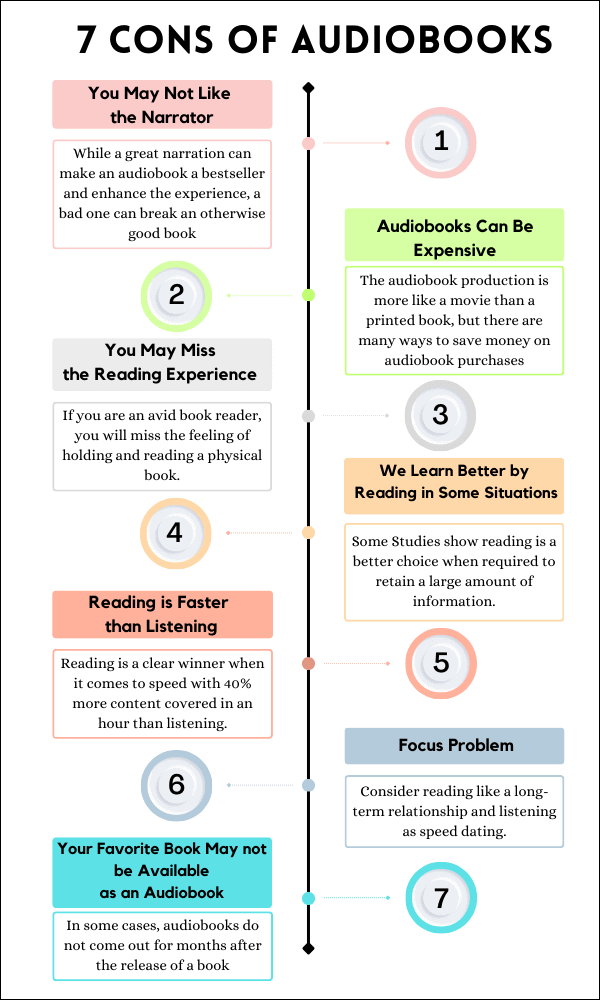
1: You May Not Like the Narrator
While a great narration can make an audiobook a bestseller and enhance the experience, a bad one can break an otherwise good book.
It may turn into a major con if you do not like the narrator’s voice or accent as it is not possible to change the narrator of an audiobook.
A good narrator knows when to control emotions. Accurate articulation and clear pronunciation are also very important.
Sometimes you do not like the narrator’s voice or speed of narration and it makes you hate the book and you end up quitting.
Solution
You should always listen to the sample of an audiobook before purchasing the full version. It gives you a taste of what to expect from the narrator.
Tip: Do you like a particular narrator? You can always search for other audiobooks narrated by the same person.
If you liked a narrator or author’s work, one of the recommended things to do after finishing an audiobook is look at other work of your favorite author/narrator.
While it is recommended to look at other works by your favorite narrator, it is always a good idea to avoid audiobooks by the particular narrator that you did not enjoy listening to.
- 17 of the Best Audiobook Narrators
- The Best Audiobook Narrators of All Time
- The Best Audiobook Narrators (and Their Best Books)
2: Audiobooks Can Be Expensive
If you look at an audiobook’s listed price, it seems expensive. There are many reasons why audiobooks are expensive including production costs and narrator’s charges.
The production of audiobooks requires audio equipment, audio engineers, editors, narrators, and many other resources.
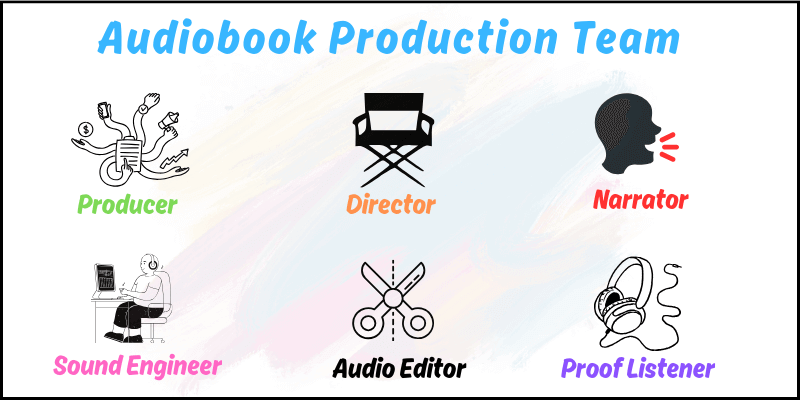
Solution
Audiobook retailer’s membership deals make financial sense and you end up saving much more than the membership fee.
There are plenty of offers, sales, and deals for members where audiobooks are available at huge discounts.
You can take advantage of Audible’s credit system to buy expensive titles for credit instead of cash.
Here are some other ways to save on your next audiobook purchase on Audible.
- Visit the Audible Deal Page frequently for daily, weekly, and monthly sales and offers
- Visit the Notification Page to sign up for sales and offers emails. You can subscribe to Daily Deals emails to never miss a deal.
- Add your favorite titles to Audible’s Wish List. This is my favorite Audible feature that notifies you when your favorite titles go on sale.
- Use cash to buy an audiobook when it makes sense. Sometimes audiobooks are available at huge discounts, as much as 80%. You can explore the Deals Under $5 section on Audible’s deals page.
- Explore the free audiobooks. Audible offers hundreds of free audiobooks in its Free Listens collection. You can get the Libby app to borrow audiobooks and eBooks from your local library if you have a local library membership. You can also get free public domain audiobooks from LibrVox, Loyal Books, and Free Classic Audiobooks.
Use your credits sensibly. Only buy titles that cost more than the credit’s price. You get one title for one credit, regardless of its price. Using your credits on buy-one-get-one-free offers and expensive titles is always a good idea.
3: You Will Miss the Reading Experience
If you are an avid book reader, you will miss the feeling of holding and reading a physical book. There are little things like flipping the pages that are not possible in audio format.
Audiobooks mean no images, graphics, or highlighting of some part to come back to it later.
Listening to a book is not the same as holding a physical book and sitting down for a reading session.
Solution
You can try Audible’s Whispersync for Voice feature to switch between listening and reading. The Immersion Reading functionality allows you to read an eBook while listening to its audiobook version.
4: We Learn Better by Reading in Some Situations
Do we learn better by reading or listening? Well, you cannot declare a clear winner. There are a series of factors including personal preferences and type of content.
According to a study published by Sage Journals, students performed better in tests after reading the material than listening to it as audiobooks. This shows reading is a better choice when required to retain a large amount of information.
Solution
Reading can be a better option in certain situations.
5: Reading is Faster than Listening
An average reader reads around 250 words/minute or 15000 words/hour. An audiobook covers around 9000 words/hour.
Reading is a clear winner when it comes to speed with 40% more content covered in an hour than listening.
If speed is your concern and you want to finish more books in less time, reading is the best option.
On the flip side, even though listening takes more time, audiobooks allow you to focus on other things as discussed under multitasking above.
Solution
All major audiobook apps come with the option to increase the narration speed. If you feel the narration is too slow, you can opt for 1.25x or 1.5x narration speed.
On the Audible Player (Android and iOS), you have the speed option to increase or decrease the narration speed.
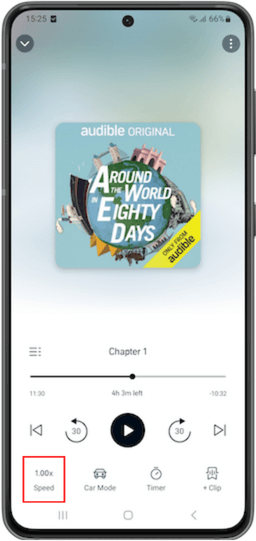
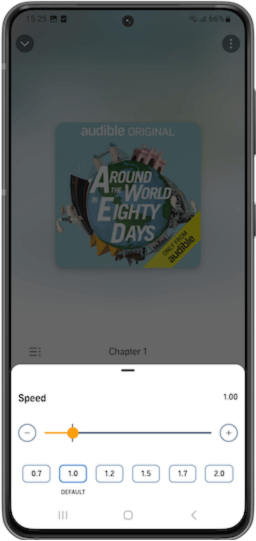
It is also available on the Cloud Player if you are listening to the Audible book on your computer.
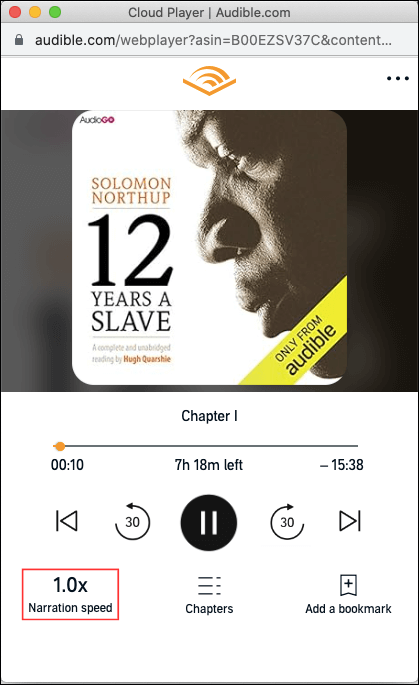
Other apps like audiobooks.com and Chirp also have the narration speed feature.
6: Focus Problem
One of the key advantages of audiobooks can also be a disadvantage for many. Avid book readers may find it hard to focus and concentrate on audiobooks while multitasking.
Consider reading like a long-term relationship and listening as speed dating.
The reader’s eye and brain are committed to the book during a reading session. Some people like to highlight the important stuff while others take notes in the margins.
Solution
Listen to the audiobooks when you can focus better. Listening while driving and on buses and trains is always better than listening in noisy places.
Stop if you cannot concentrate because you are too tired. Have dedicated listening sessions like you take time out for reading.
7: Your Favorite Book May not be Available as an Audiobook
You may run into situations where an audio version of a book is not available. In some cases, audiobooks do not come out for months after the release of a book.
Audiobook lovers hate it when they find out that the latest book in their favorite series is not releasing anytime soon.
Solution
There is not a straightforward solution to this disadvantage of audiobooks. You can give the following options a shot, depending on your device.
- iPhone users may try the swipe-to-read features on their phones
- Android users can try apps like Evie
- Alexa feature can read a book to you
- Kindle users can use the text-to-speech feature on their devices
Do not keep your expectations high as the audio may sound robotic and Ai-generated.
Similarities Between Listening and Reading a Book
The above pros and cons of audiobooks highlight the advantages and disadvantages of audio format vs physical book.
Despite the above differences, both methods share many similarities between them.
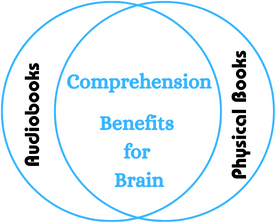
Audiobooks and physical books serve the common purpose of acquiring information from the book. Here are the 2 important common things between the audio version and physical books.
1: Comprehension
An ‘Audiobook vs reading’ research by the University of North Dakota showed that the difference between listening and reading when it comes to comprehension is negligible.
Even though our brain processes the information differently, there is no difference in comprehension between both types of consuming the content.
2: Listening is as Beneficial for the Brain as Reading
According to a study by UC Berkeley, researchers scanned the brains of nine participants during listening and reading sessions to conclude that stories stimulated the same cognitive and emotional areas, regardless of the medium.
The brain scans and data analysis show the brain is simulated in the same way for audiobooks and reading.
To our brains, it does not matter if we read or listen and cognitive benefits are the same.
Conclusion: Listening to Audiobooks vs Reading Physical Books?
The audiobook format makes more sense in some situations and reading a physical book may be beneficial in certain situations.
Listening to an audiobook makes more sense if
- You have reading difficulties (visual impairment, dyslexia, unable to hold heavy books)
- You want to receive information effortlessly (while driving, cooking, gardening, etc)
- You are traveling as you can take more books in audio format with you
- On road trips. The whole family can listen to the same book on the car’s audio system
- You are concerned about the environment. Audiobook is the most environment-friendly format.
Reading makes more sense when
- You have focus and concentration problem
- You want to finish more books as reading is faster than listening
- Your favorite title is not available in audio format
In short, it depends on personal preferences. Both reading and listening fulfill the basic purpose of acquiring information.
While listening is more convenient, some people prefer the experience of reading a physical book.

